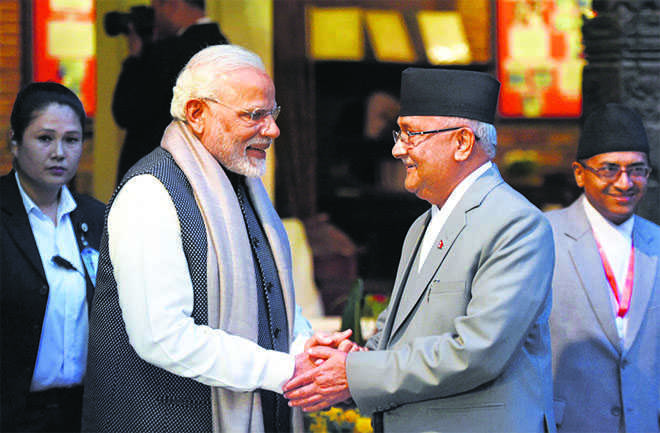
Strategic talks needed: Nepal is perceived as an opportunistic state.
Bhartendu Kumar Singh
Indian Defence Accounts Service
While Indians are still discussing Nepal’s pullout from the BIMSTEC military exercises that concluded recently, an assertive Nepal has also gone ahead and participated in Sagarmatha Friendship-2 (joint military exercises with China) in the latter's Chengdu city. The two exercises, without doubt, were symbolic due to less manpower involvement. But Nepal's military manoeuvres and tectonic shift towards the Chinese military sphere of influence point to a larger picture — search for a distinct identity capable of saying ‘no’; enhancing its bargaining power, and origin of a possible Sino-Nepal military alliance. Together, these issues may graduate into geographic insecurities for India.
China-related factors
Nepal may have factored the appropriateness and relevance of military exercises as part of the BIMSTEC club apart from internal political divisions while deciding the pullout, but several China-related factors could have played the back-end spoiler.
1 Chinese foreign policy establishments, media and strategic experts pooh-pooh the BIMSTEC grouping and question its future. This is perhaps because the group is India-centric. China, an outsider, has only tangential influence in BIMSTEC's initiatives. Divisions and dissensions within the BIMSTEC group suit China’s own agendas, like the ongoing Belt and Road Initiative (BRI) in some member states. Nepal's withdrawal from the BIMTEC military exercise was also given wide coverage in Chinese media to expose the so-called chinks in the grouping.
2 There is a strong lobby amongst Nepalese political elites supporting increased military tie-ups with China, perhaps to enhance Nepal's bargaining power vis-a-vis India and optimism gains. As a land-locked country largely dependent upon India, Nepal perhaps has a basketful of demands, assurances and inducements from India in several sectors. Little wonder, Nepal's proposed participation in the BIMSTEC military exercise had become a divisive issue in the domestic politics. Prime Minister KP Oli, hitherto a known protagonist for China, was initially supportive of the military exercise. The exercise was in the offing since June 2018 and was indeed well planned. Therefore, it is debatable if Nepal had taken a unilateral decision of the last-minute pullout on its own without signals from Beijing and the China lobby in Kathmandu. It also signifies towards what Stephen Walt would call as 'origin of (Sino-Nepal) alliances' like the flourishing Sino-Pak alliance. If that happens, India would face another front in the form of a Sino-Nepal nexus.
3 As if to tease India, Nepal has participated in Sagarmatha Friendship-2 with China with almost concurrent timings. Counter-terrorism was again the thematic objective of the exercise, much like the first round. On this theme alone, the BIMSTEC military exercise was a truly multilateral platform to learn from the experience of many countries. Nepal would have had the added advantage of hearing out the service chiefs of many countries and design a cost-effective counter-terrorism strategy. Therefore, it is debatable if Nepal was really serious in honing its counter-terrorism strategies since it conveniently skipped a larger multilateral platform and chose to attend a small bilateral platform.
Nepal's balancing (against India) and bandwagoning (with China) game in military diplomacy is not without intents and inferences. The country, sandwiched between two great powers, is using all possible textbook methods to play one great power against another. India cannot expect to have any frictionless strategic understanding with Nepal and may have to face more chess-board moves.
Further, Nepal is inching towards geographic autonomy, though it might come at a cost. Military relations apart, Nepal is also moving towards China in other areas. It has got access to Chinese sea and land ports, and has comprehensive Chinese involvement in its infrastructure projects in roads, railways, airports.
What India should do
The signals emanating from the two small but concurrent exercises leave India with an increasing sense of fatalism or helplessness about Nepal's military inclination towards China. Nepal is increasingly perceived as an opportunistic state, reflecting occasionally hostile behaviour, and seeking a favourable position for itself.
However, we have not done enough to overcome our security dilemma arising out of military interaction between China and Nepal. Forget taking advantage of excellent societal relations, we have not even been in a position to build on the institutional ties between the two militaries. For instance, thousands of Gorkhas living a retired life have not been used as ambassadors towards proliferating goodwill for India. India, therefore, needs to explore and expand the basket of tools for overcoming its security dilemma arising from Nepal.
-
One way could be to have instituionalised strategic dialogue on iterated basis with Nepal to convey India's security concerns.
-
Another way could be to treat military relations with Nepal as an independent variable without any conditional linkage to Sino-Nepal military relations. However, this would be a workable arrangement only if India is able to manage the ‘push and pull’ factors in weaning Nepal away from China through cooperative games.
-
India needs to encourage Nepal towards a bilateral security community through an agreed framework. Providing Nepal cost-effective military hardware from India’s own domestic military industrial complex (MIC) is one representative example that can enable the two countries in moving towards the right direction.
Nepal's military manoeuvres may continue since its political establishment finds it lucrative and China too is willing to fish in troubled waters. But if India can make diplomatic investments in institutionalised strategic dialogue, it may expect some emblem of neutrality from Nepal. Probably, there lies some hope for restrained military manoeuvres by Nepal.
Views are personal



























